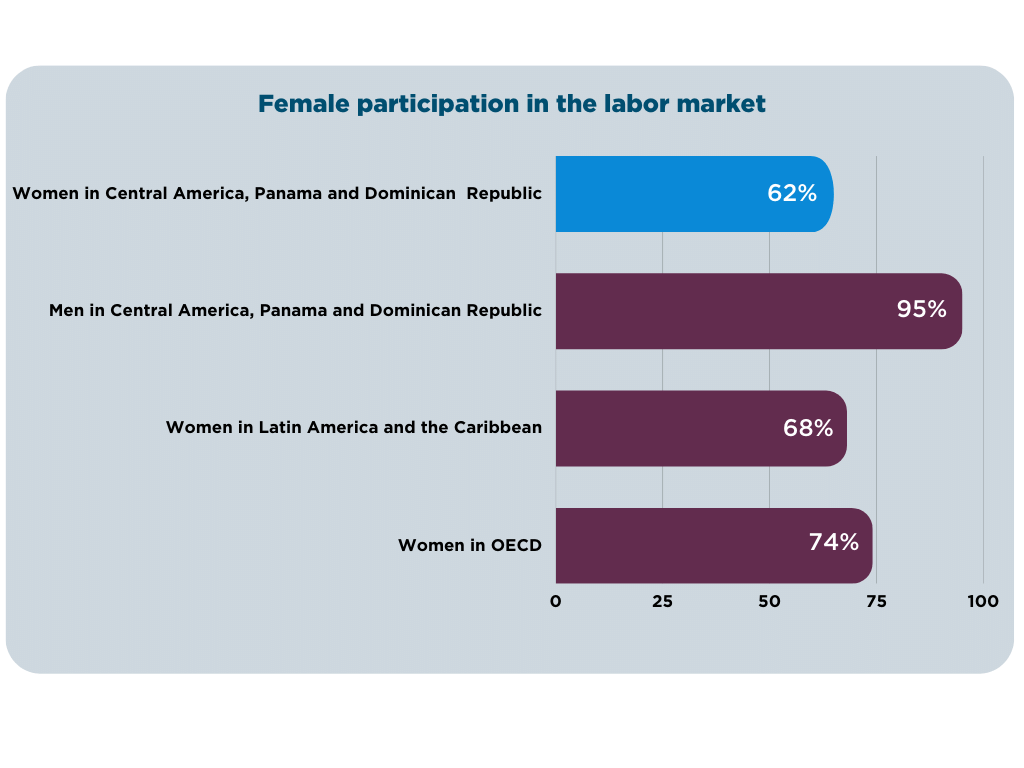Women in Central America, Panama and the Dominican Republic participate less in the labor market than men, less than the average for women in Latin America and the Caribbean, and less than women in the OECD:

This directly impacts the growth of countries and even affects the region’s GDP per capita. One of the factors influencing this situation is the set of social norms and laws that do not always apply equally to women and men. What would happen if gender equality laws were implemented in these countries? What would the countries look like if gender norms sought the inclusion of women in the same roles as men?
The potential of laws for gender equality in Central America, Panama and Dominican Republic
Legal changes to increase gender equality in labor matters would increase not only female labor participation, but also the region’s GDP per capita. This is shown in the study “Assessing the effect of gender-related legal reforms on female labour participation and GDP per capita in the Central American region”. For example, if legal changes were made in Central America, Panama and the Dominican Republic, such as:
- Establishment of equal pay for equal work
- Paid parental leave
- Promotion of women’s participation in all occupations in the same way as men
It is estimated that their female labor participation rate would increase by 6 percentage points and their GDP per capita by about 1.5 percentage points.
Certain regulations exist that prevent women from working in jobs deemed risky and raise the expenses for companies looking to hire them. For instance, there are costs associated with maternity leave exclusively for women, as well as lower retirement ages. Conversely, there is a lack of rules to address gender discrimination.
The role of social norms
In a broader approach, the study “Gender Gaps in STEM occupations in Costa Rica, El Salvador and Mexico” suggests that if social norms that lead to a greater burden of household duties, and legal and cultural norms that result in lower wages for the same work and less human capital accumulation were eliminated, real GDP would have been 14% higher in a country like Mexico in 2018, and 3% if this occurred in science, technology, engineering and mathematics (STEM) occupations.

Certain social norms perpetuate the belief that women excel in service-oriented and caregiving roles, while men are considered more skilled in industrial, manual work, and as superior business executives.
According to the global values survey, approximately 19% of the population in Guatemala, Mexico, and Nicaragua still hold the view that men make better business executives than women.
Similarly, the average percentage of 20% is reported in Argentina and Brazil, and it drops to 16% when the respondent is a woman.
The road ahead towards gender equality
Despite the extraordinary progress made in Central America, Panama and the Dominican Republic in laws to ensure women’s economic inclusion, their scope is still limited. First, because it applies mainly to women in the formal sector and therefore leaves women in the informal sector unprotected. This point is key, since two out of every three jobs in the region are in the informal sector. That is, employees who do not pay social security contributions.

Second, because the legal framework to promote equal rights is still incomplete. For example, non of these countries offer paid parental leave. This applies when both parents are legally entitled to some form of full-time parental leave, either shared between the mother and father or as an individual right.
At the same time, there are also no mandates guaranteeing several of the above measures at the legal level. For example, in some cases the government is not responsible for administering 100% of maternity leave benefits, and in some countries in the region, paid leave of at least 14 weeks is not available to women.
It is important to recognize that changing laws or social norms is not an automatic process. Changing laws can become a complex process depending on fiscal space and political conditions. Whereas social norms are a construct that is gradually fabricated by a variety of factors, such as education, environment, and the laws themselves. However, identifying legal changes that reduce inequity and favor all people is a first step in advancing both processes.


Leave a Reply